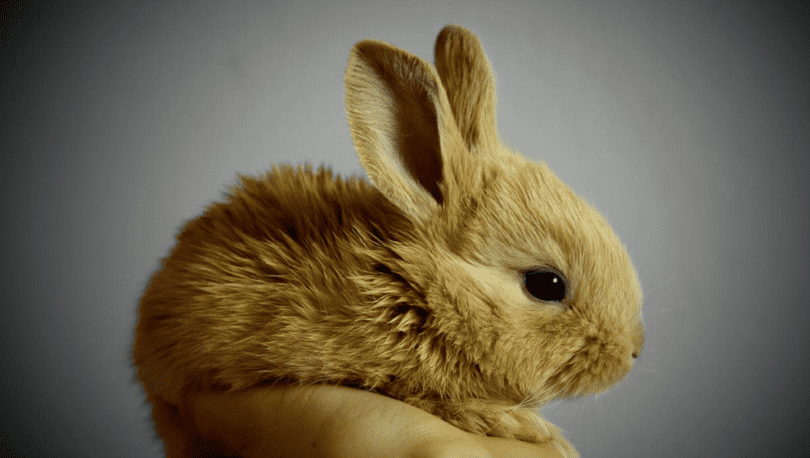It is common for rabbit owners to see their rabbits lying down. Sometimes, they show no movement and seem dead. They may show jerky movements, giving the impression that they are unwell or undergoing a seizure. This is good news! It’s nothing to be concerned about such behaviour. Your rabbit preferably likes to sleep in this posture.
In general, a rabbit lying down means that it is relaxing and feeling secure. You do not need to be concerned about your rabbit’s health unless they are unresponsive when you try to wake them up.
Table of Contents
Why My Rabbit Is Lying Down For A Long Time?
Pain, temperature, comfort, and age are the most typical reasons for a rabbit’s unexpected lying down.
Pain
Rabbits who are in pain will most likely hide and rest a lot. Rabbits do not like to show their sadness. If the rabbit is lying down due to pain, it will show the following symptoms:
- Fatigue
- Difficulty in movement
- Grinding their teeth
- Curved body posture
- Increased water intake
- Bulging eyes
In case of pain due to any reason, veterinarian advice should be taken immediately.
Temperature
In the summer, when it’s hot outside, rabbits are less active. Greater physical activity during the hot months would only make things worse for your rabbit. So, you may notice that your rabbit is less active and sleeps more than usual. The maximum at which a rabbit can survive is 85°C. Monitor your rabbit’s temperature regularly if you are living in a humid place. At a temperature higher than this, rabbits will prefer to lie down more. Because moving around a lot while it is hot puts your rabbits at risk of heatstroke.
If a rabbit is lying down due to high temperature, you can check its ears. Place a cold water bottle wrapped in a towel near the rabbit to cool them.
Age
Your rabbit’s age can also affect how much time he sleeps. Older rabbits that are greater than 6 years old have less energy and will likely sleep more.
Comfort
The comfort level of the rabbit is an important factor that highlights the relaxing phase. Finally, rabbits who are not at ease in their surroundings are more prone to lie down less than usual. This situation is normal. There is nothing to worry about. After they have become used to their new surroundings, they start to rest more.
Rabbits Lying Down In Different Positions
Rabbits can lie down in the following positions:
- They can lie down with their legs tucked under them.
- If their front paws are pointed forward, and their back legs are sticking out sideways. Their bodies will be relaxed and expanded as well.
- If they’re lying down with their back legs outstretched behind them and their front paws pointed forwards, they’re fully extended and relaxed.
Rabbits can also enjoy lying down in a combination of all three of the above positions in a variety of locations.
Several Behaviours Which Rabbits Show While Lying Down
Rabbits lie down in several positions, and every position depicts a particular behaviour. From their laying positions, rabbits can tell us a lot. They are not comfortable when they are lying down on their side with extended ears and stretched muscles. In such a position, they are feeling threatened by something.
Rabbits in a normal state are resting on their side and sleeping with relaxed muscles. They are only interested in lying down and sleeping when happy and satisfied.
Rabbits can lie down in the following manner:
Rabbit Lying Down With Head-On Floor
It is a common occurrence to see rabbits lying down with their heads on the floor. It indicates that they are in distress. Rabbits’ muscles stiffen up in a bent position, and their ears are wide and flat against their backs. Their pupils dilate at the same time, which indicates that rabbits are sad or that something is wrong with them.
Rabbit Shaking While Lying Down
It is normal for rabbits to shake while lying down. It is not common when the shaking is accompanied by additional symptoms, which is known as the “End of life stage.”
A rabbit may shake while lying down for a variety of medical reasons. It could be heatstroke, which you can treat by placing a water bottle wrapped in a cloth near the rabbit. However, it could also be a parasite or bacteria that affects the brain’s neurological system, causing shaking or seizures. If this is the case, take your rabbit to a veterinarian right away.
Rabbits Lying Flat On Tummy
Lying flat on the Tummy is not harmful to the bunny. This is natural in rabbits, as you will see. It is also normal for a bunny to lay on its side. When they want to relax, they lie on their stomachs.
When rabbits sleep, they will occasionally put their heads down and appear cute. When predators attack, it is also the best defensive tactic to use.
Rabbits Lying Down On The Side
The majority of the time, a rabbit lying on its side is simply sleeping. They don’t appear to be sick or dying. Instead, when rabbits feel entirely safe and confident in their surroundings, they will sleep in this position.
This is known as a rabbit flop. Many individuals who are new to rabbits will be scared when they see their bunny suddenly fall over onto their side and lay still because it is such an odd position. But, over time, you’ll come to regard this position as a great compliment from your bunny, as it means that they place a lot of faith in you.
Rabbits Panting While Lying Down
When individuals are exposed to extremely hot or cold temperatures, they naturally sweat to maintain their body temperature. When we are in a cold environment, we begin to shiver to generate heat. Rabbits do the same thing, which is referred to as panting.
When rabbits pant, it means that they are overheating. Extreme temperatures, bulky clothing, and fur can all contribute to this.
Drastic Behavioral Changes
You will notice a difference in the rabbit’s behaviour when it is sick. It can cause weakness, and rabbits will be unable to migrate from one location to another as a result. They will not respond to exhibit interest in their favourite items if they are in this state. They will appear messy and uninterested.
In this situation, rabbits can get hostile, and you must remain cool. There could be some underlying pain causing the shift in behaviour.
I hope this article helps you answer your query. If you have any questions, you may comment below or email us. We would be happy to help.








